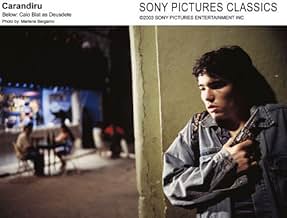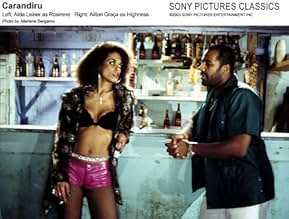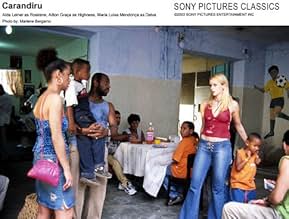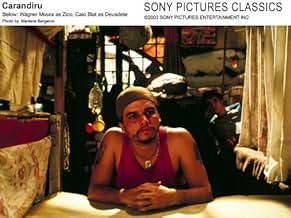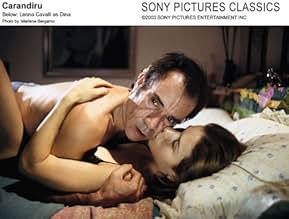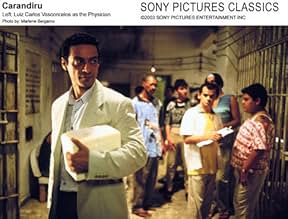Stories of crime, revenge, love, and friendship at the Carandiru Penitentiary, the largest prison in Latin America.Stories of crime, revenge, love, and friendship at the Carandiru Penitentiary, the largest prison in Latin America.Stories of crime, revenge, love, and friendship at the Carandiru Penitentiary, the largest prison in Latin America.
- Awards
- 16 wins & 33 nominations total
Enrique Diaz
- Gilson
- (as Enrique Díaz)
Aida Leiner
- Rosirene
- (as Aída Leiner)
Vannessa Gerbelli
- Célia
- (as Vanessa Gerbelli)
Featured reviews
Carandiru is a true hymn of humanity in all of us. What let the Brazilian riot squad shoot down over a hundred inmates was that following both prejudice and the professional drilling they had been subjected to, they regarded the rioters of 1992 as nothing but worthless scum. Bebenco does not defend his characters. Based on the eyewitness account of the prison physician, he presents us with assassins, murderers, robbers and drug-dealers who do not even claim they do not deserve their sentences (although many were kept in prison without convictions). What made them human was their continuous contact with the world outside. The visitation day scene is a memorable tribute to life in a truly Christian sense - everyone deserves to live and to hope not because of his own qualities or deeds, but because of the love others share for him. The character of the serial killer Dagger was essential to this purpose. His solitude in the midst of the modest pleasures of everybody else visited by his close ones was the first sign of the overcoming guilt which eventually took him to the preacher. Let this review not be understood as if the movie pursues to proselytize the viewers; I hope not to be too cynical to say that its prime purpose is to rejoice - to rejoice with the great diversity of human characters to whom Dr Varella and H. Bebenco paid their tribute.
'Carandiru' is a film based on the real experiences of Dr Drauzio Varella. He worked in Carandiru prison in Sao Paulo, Brazil, in the late 80s/early 90s carrying out Aids prevention work. During his work he came to know a lot of the inmates closely, and as he was a doctor got to see prison life in a way the other prison workers didn't. He made friends with a lot of the inmates, and learned a lot of their personal stories. The prison is extremely cramped, and the situation came to a climax in 1992. One entire block of the prison fell under prisoner control and a riot squad was sent in, killing 111 men.
The film is being dubbed by some as "this year's City of God", but it's very different to last years Brazillian smash. Where 'City of God' had some very flashy direction and MTV-ized zip-bang editing, 'Carandiru' is pretty straight forward. The film still has some great direction though, Hector Babenco has a leisurely style (matched by his actual output, it's been 7 years since his last film, and nearly 20 since 'Ironweed'), allowing the story the space it needs to breathe but still picking up the pace to build tension. Ironically the only section of the film I didn't really like was the bit that was the most 'City of God'-like. When the doctor is dealing with his patients he asks each one what their story is, and sometimes it's a bit forced, just like in 'City of God' with the "now it's my turn to tell you my story".
Where it's very similar to 'City of God' is it's themes - it's essentially a humanist comedy with a moral edge, dealing with love, hate, revenge, innocence and betrayal. The cons are poor and murderous, but lovable at the same time. If this film and 'City of God' are to believed drug-dealing thieving murderers all have their hearts in the right place and are all okay guys who just took a wrong turn on the road.
There's a bit of a stink being kicked up at the moment on the imdb forum for 'Carandiru'. A lot of Brazillian's are posting, very upset with filmmakers consistently showing Brazil in a negative light. I think that although both films do have that slant to them, they have actually increased interested in the country, and even more so the countries film output, taking it to a global audience. If all Scottish films are to be believed we're all a bunch of Glasweigan Gangster Hardnuts or heroin-addicted thieving murderers too, so I fail to see what the fuss is about.
The director drives home the real point of the film in the last 20 minutes. The overcrowding and in-fighting finally erupts into a full-blown riot that results in the main characters block being taken over by the prisoners. A riot squad enters, and the ensuing rampage is one of the most graphic and genuinely shocking ever committed to film. Definitely not for the faint-of-heart. I remember seeing the prison riot being reported in the UK news, and being appalled at how crowded the prison was, and how a government could let it reach boiling point like that. The last 20 minutes really smacked that home, but with the closing shots of the prison finally being demolished in 2002 you feel like there was at least some sort of closure on the tragedy.
The story is harrowing, but heart-warming, and the acting (mostly from unknowns) is top rate. It's my favorite film of the year so far, but do beware the last 20 minutes, you won't leave the cinema feeling happy.
The film is being dubbed by some as "this year's City of God", but it's very different to last years Brazillian smash. Where 'City of God' had some very flashy direction and MTV-ized zip-bang editing, 'Carandiru' is pretty straight forward. The film still has some great direction though, Hector Babenco has a leisurely style (matched by his actual output, it's been 7 years since his last film, and nearly 20 since 'Ironweed'), allowing the story the space it needs to breathe but still picking up the pace to build tension. Ironically the only section of the film I didn't really like was the bit that was the most 'City of God'-like. When the doctor is dealing with his patients he asks each one what their story is, and sometimes it's a bit forced, just like in 'City of God' with the "now it's my turn to tell you my story".
Where it's very similar to 'City of God' is it's themes - it's essentially a humanist comedy with a moral edge, dealing with love, hate, revenge, innocence and betrayal. The cons are poor and murderous, but lovable at the same time. If this film and 'City of God' are to believed drug-dealing thieving murderers all have their hearts in the right place and are all okay guys who just took a wrong turn on the road.
There's a bit of a stink being kicked up at the moment on the imdb forum for 'Carandiru'. A lot of Brazillian's are posting, very upset with filmmakers consistently showing Brazil in a negative light. I think that although both films do have that slant to them, they have actually increased interested in the country, and even more so the countries film output, taking it to a global audience. If all Scottish films are to be believed we're all a bunch of Glasweigan Gangster Hardnuts or heroin-addicted thieving murderers too, so I fail to see what the fuss is about.
The director drives home the real point of the film in the last 20 minutes. The overcrowding and in-fighting finally erupts into a full-blown riot that results in the main characters block being taken over by the prisoners. A riot squad enters, and the ensuing rampage is one of the most graphic and genuinely shocking ever committed to film. Definitely not for the faint-of-heart. I remember seeing the prison riot being reported in the UK news, and being appalled at how crowded the prison was, and how a government could let it reach boiling point like that. The last 20 minutes really smacked that home, but with the closing shots of the prison finally being demolished in 2002 you feel like there was at least some sort of closure on the tragedy.
The story is harrowing, but heart-warming, and the acting (mostly from unknowns) is top rate. It's my favorite film of the year so far, but do beware the last 20 minutes, you won't leave the cinema feeling happy.
I saw Carandiru after seeing Takeshi Kitanos "Zatoichi" at the Toronto Film
Festival. Let me tell you, my day was full of carnage but it's OK because both movies were very good. The director was there as well as an actor or two if I remember correctly, they spoke about the film with true passion which added to the essence of the final product. It opend my eyes to an event that I never knew of. Highness was a great charater, Graca was my favorite, he should learn
english and get into the indie scene in North America. Good film 7\10.
Festival. Let me tell you, my day was full of carnage but it's OK because both movies were very good. The director was there as well as an actor or two if I remember correctly, they spoke about the film with true passion which added to the essence of the final product. It opend my eyes to an event that I never knew of. Highness was a great charater, Graca was my favorite, he should learn
english and get into the indie scene in North America. Good film 7\10.
Carandiru is the true story of the greatest massacre of prisoners in the world. It happened in 1992, in São Paulo, after a rebellion in the greatest Brazilian penitentiary. Doctor Drauzio Varella has written a successful best-seller about this sad event. The great Brazilian naturalized director Hector Babenco (from `Pixote', `Kiss of the Spider Woman', `Lúcio Flávio' etc.), with the support of a fantastic cast, presented a good movie about this wound in our society. The screenplay presents some personal dramas of some prisoners before the invasion of the prison by the Military Police and execution of one hundred and eleven (111) prisoners. The double Brazilian DVD is magnificent:, presenting not only the usual making-of, interviews, deleted scenes and errors, but also the TV News in 1992 after the slaughter. My vote is eight.
Despite what some reviews and reviewers state, Carandiru is, for the large part, gloriously human and humane, without ever resorting to mawkish sentimentality. The story is based on a real event and when I saw it on TV some years ago and I so much wanted to see it again, I bought the DVD, now cheap.
Yes, these characters are a handful of long-term convicts in one of largest prisons in the world - 7000 of them, in one (in San Pualo, Brazil), that's designed for 'only' 4,000 and we are introduced to them and their frank, matter-of-fact lives as they describe their drug and sex life 'inside' to the wonderfully open and compassionate doctor ( Luiz Carlos Vasconcelos). It's from his perspective as, part of his training, he's thrown into the deep end as he tries to treat and educate prisoners about AIDS.
Amongst the knowing humour, there are tales of anguish, violence and heartache with the main character's stories being run as flashbacks. Most of the crime is petty but circumstance and poverty has dumped most of these damaged people into one huge melting pot, of squalor, STD's and drugs. One finds it surprisingly easy to be open and impartial about situations that could make your toes curl.
Despite the vivid colours used and the Latin music that gets played in and amongst this tapestry of a human jigsaw, where few of the pieces fit, mounting signs reveal an underbelly of unrest, a pressure-cooker that's about to boil over and when it does and armed police march in, the film turns dark, angry and really hits the viewer. I won't say why, though the closing epilogues do (very) partially redress some of what went on.
This is essential Brazilian drama. Gritty, hard-hitting, yes but if you've got the stomach for the excellent City of God, you'll have no trouble here. Buy it, watch it, you'll feel like a proper human being, I promise you.
Yes, these characters are a handful of long-term convicts in one of largest prisons in the world - 7000 of them, in one (in San Pualo, Brazil), that's designed for 'only' 4,000 and we are introduced to them and their frank, matter-of-fact lives as they describe their drug and sex life 'inside' to the wonderfully open and compassionate doctor ( Luiz Carlos Vasconcelos). It's from his perspective as, part of his training, he's thrown into the deep end as he tries to treat and educate prisoners about AIDS.
Amongst the knowing humour, there are tales of anguish, violence and heartache with the main character's stories being run as flashbacks. Most of the crime is petty but circumstance and poverty has dumped most of these damaged people into one huge melting pot, of squalor, STD's and drugs. One finds it surprisingly easy to be open and impartial about situations that could make your toes curl.
Despite the vivid colours used and the Latin music that gets played in and amongst this tapestry of a human jigsaw, where few of the pieces fit, mounting signs reveal an underbelly of unrest, a pressure-cooker that's about to boil over and when it does and armed police march in, the film turns dark, angry and really hits the viewer. I won't say why, though the closing epilogues do (very) partially redress some of what went on.
This is essential Brazilian drama. Gritty, hard-hitting, yes but if you've got the stomach for the excellent City of God, you'll have no trouble here. Buy it, watch it, you'll feel like a proper human being, I promise you.
Did you know
- TriviaDr. Dráuzio Varella wrote the original book at the encouragement of a patient he was treating for lymphatic cancer. That very patient happened to be Hector Babenco, who recovered and went on to direct the film adaptation.
- GoofsDuring the riot, as the inmates are running up the stairs of the cell block shortly after the riot squad has entered, one inmate can be seen wearing a T-Shirt of hip-hop group the Wu-Tang Clan. The group only formed in the year the riot took place (1992), and did not release their first widely available album (36 Chambers - Enter the Wu-Tang) until the following year. It is unlikely they would at this time have had a following in Brazil, nor would merchandise be available.
- Quotes
Lady Di: I've come to take the test.
Médico - Physician: Please, take a seat. First, I'd like to ask you a few questions, Lady Di.
Lady Di: I've seen this movie before, doctor. I've never needed a blood transfusion and I never pierce my veins. The only drug I use is a joint now and then... when I watch TV or for a little romance.
Médico - Physician: And partners, how many?
Lady Di: Oh, about 2000.
- ConnectionsFeatured in 2005 Glitter Awards (2005)
- How long is Carandiru?Powered by Alexa
Details
- Release date
- Countries of origin
- Official site
- Language
- Also known as
- Vzbura vo väznici Carandiru
- Filming locations
- Production companies
- See more company credits at IMDbPro
Box office
- Budget
- R$12,000,000 (estimated)
- Gross US & Canada
- $216,335
- Opening weekend US & Canada
- $17,945
- May 16, 2004
- Gross worldwide
- $10,781,635
- Runtime
- 2h 25m(145 min)
- Color
- Sound mix
- Aspect ratio
- 1.85 : 1
Contribute to this page
Suggest an edit or add missing content







